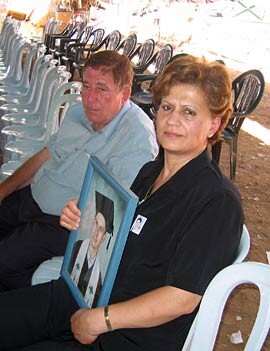
Rami Fadayel’s parents, Rizik and Mona, at the Palestinian Prisoners’ Solidarity Tent in Ramallah, 27 August 2004. (Photo: Rima Merriman)
Rami, who is now 24 years old, was likewise absent from his own engagement party, which his family held for him on April 4, 2004, on the Day of the Palestinian Prisoner. Arrested on January 11, 2003, he was in Ofar prison in Ramallah serving a sentence of 42 months. He is still there with 1,200 other prisoners living in tents, each of which includes 4 beds and holds 25-30 prisoners.
At the request of the family, the officiating priest at Rami’s engagement ceremony had arranged, through the International Red Cross, for the rites to be read at prison. But these arrangements fell through when the time came. There is a thick photo album of the ceremony waiting for Rami at home for when he is released.
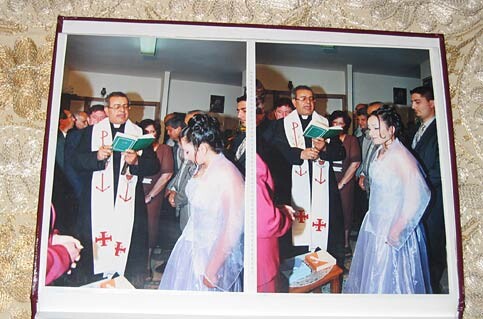
Photos from the album of the engagement party at which Rami could not attend. (Photo: Family Handout)
The accusations against Rami Fadayel are as follows:
- Being active in organizing in the Popular Front for the Liberation of Palestine 96-99 (when he was 16-19).
- Throwing stones, and
- Attempting to throw a Molotov.
When Rami knew that the Israeli forces were after him, he hid in various places and managed to escape arrest for a year and a half. Before catching him in one of his hiding places, Israeli soldiers had come to his home a total of five times to search for him. At one time they arrested his two brothers, beating them, and making them walk blindfolded alongside the tank, so that they would stumble and fall down. Neither was allowed to use the bathroom for 24 hours. The object was to interrogate them as to the whereabouts of their brother.
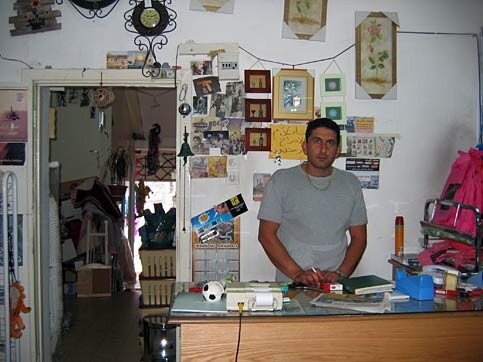
Rami’s brother Fayeq at the family’s shop in downtown Ramallah. (Photo: Rima Merriman)
Fayeq (29), who works with his father at their household goods store in downtown Ramallah, was held for eight days at Beit Eel, the Israeli military base in Ramallah. Ra’fat (26), who has a master’s degree in accounting from Birzeit University, was held for 12 days. During that time, their family had no word from them. Because the military police lost Ra’fat’s ID, they gave him an instamatic photograph of himself holding a sheet that identified him.
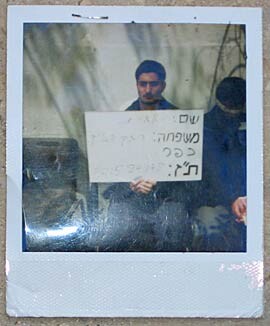
A Polaroid photo given to Rami’s brother, Ra’fat, to use as an ID after he was held for 12 days and interrogated about the whereabouts of Rami. (Photo: Family Handout)
When they were able to get back to their home to survey the wreckage, the Fadayel family noticed that a picture of Jesus Christ they had on the wall of their living room had been turned so that its back was showing. On another wall, the enlarged photograph of Rami Fadayel’s grandparents, taken in Jaffa when his father Rizik was a boy, was luckily left intact. Rizik’s parents owned a bed-making factory in Jaffa before they were driven out in 1948 and not allowed to return.
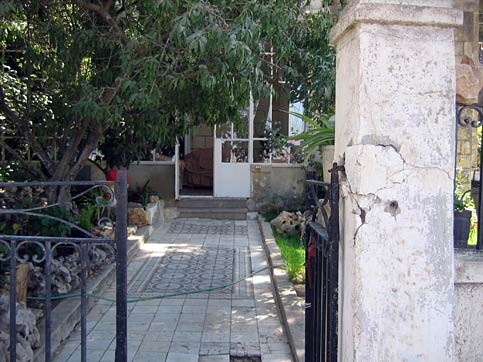
Bullet holes in the column at the entrance of Rami’s home. (Photo: Rima Merriman)
On the night of January 11, “Captain Loai,” as he called himself, came to the Fadayel’s home at 2:00 a.m. on January 11, 2003. He had already arrested Rami, but he did not inform the family of the fact. He and his soldiers ransacked the house, toppling down the Christmas tree that was still up, and voicing loudly, in good Arabic, his disappointment that Christians would raise their children in “such a way.”
One item he found incriminating and confiscated was a photo album the family kept of the funeral of Issa Abed (Abu Saree’), a janitor at Birzeit and a friend of Rami’s. Issa was shot in the head at a demonstration in Ramallah in 2000. He was bending down to pick up a stone to throw when the rubber bullet rendered him unconscious. He died at hospital the following day. He was 29.
The other thing that was notable during that raid was the deliberate trampling underfoot of Ra’fat’s accounting textbooks, which appeared to infuriate the officer.
At Rami’s hearing in Beit Eel on August 1, 2004, the set up is such that the parents are not allowed contact with the prisoner. But after Rami heard his plea-bargained sentence, he struggled to approach his mother and embrace her. He succeeded in doing so at the cost of a beating by a soldier, which injured his arm. When he was taken outside, he was ordered to collect the garbage out in the street as punishment, but he refused and was deprived of food for the day.
Rizik and Muna Fadayel have been able to visit their son once since his imprisonment, but their application for a second visitation was denied.
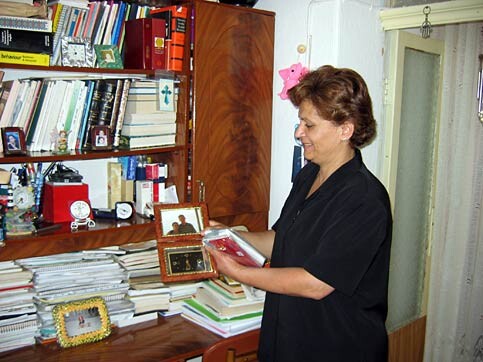
Rami’s mother in his bedroom. (Photo: Rima Merriman)
Related Links
Rima Merriman is a freelance writer and a communications specialist. She has been working in the West Bank for the past four months.





